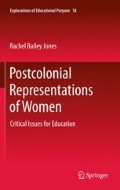Abstract
Building on the historical and cultural roots of colonialism described in Chapter 2, Chapter 3 more fully explores the ways that biased and often racist notions of difference that have entered into the classroom through forms of official and unofficial curriculum. Western patriarchal structures that supported colonialism and other forms of domination have also created the official state schooling system and curriculum for both the colonizers and the colonized. Colonial schools were constructed in order to distribute the official knowledge of empire; access to education and the language of power were controlled by administrations that were generally wary of resistance and revolt. Some European women traveled to the colonies as missionaries and educators and played a role in the establishment of limited schooling for girls. The colonial system of education officially ended with independence movements of the twentieth century; however, much of the knowledge created and legitimized during that period are still reverberating in official and unofficial forms of contemporary education. The interests of the dominant culture created distorted images of women, the so-called third world, the primitive, savage, and irrational Other and reproduces these images through education.
Access this chapter
Tax calculation will be finalised at checkout
Purchases are for personal use only
References
Adams, D. W. (1997). Education for extinction: American Indians and the boarding school experience 1875–1928. Lawrence, Kansas: The University Press of Kansas.
Ahmed, L. (1992). Women and gender in Islam. New Haven, CT: Yale University Press.
Alexander, M. J. (2005). Pedagogies of crossing: Meditations on feminism, sexual politics, memory, and the sacred. Durham, NC: Duke University Press.
Bailey, T., & Kennedy, D. (1987). The American pageant: A history of the republic (8th ed.). Lexington, MA: D. C. Heath and Company.
Beck, R., Black, L., Krieger, L., Naylor, P., & Shabaka, D. I. (2005). World history: Patterns of interaction. Evanston, IL: McDougal Littell.
Bhabha, H. (1994). The location of culture. New York: Routledge.
Blunt, A. (1994). Mapping authorship and authority: Reading Mary Kingsley’s landscape descriptions. In A. Blunt & G. Rose (Eds.), Writing women and space: Colonial and postcolonial geographies (pp. 51–72). New York: The Guilford Press.
Clifford, J. (1988). The predicament of culture: Twentieth century ethnography, literature, and art. Cambridge: Harvard University Press.
Douglas, M. (1966). An analysis of concepts of pollution and taboo. New York: Routledge.
Farah, M., & Karls, A. B. (Eds.). (1997). The national geographic society. World history: The Human experience. New York: Glencoe/McGraw Hill.
FitzGerald, F. (1979). America revised: History schoolbooks in the Twentieth century. Boston: Little, Brown and Company.
Geertz, C. (1977). The interpretation of cultures. New York: Basic Books.
Grewal, I. (2005). Transnational America: Feminisms, diasporas, neoliberalisms. Durham, NC: Duke University Press.
Hubbard, G. (1987). Art in action. San Diego: Coronado Publishers.
Hubbard, G., & Rouse M. (1981). Art: Meaning, method and media. Chicago: Benefic Press.
Jayaweera, S. (1990). European women educators under the British colonial administration in Sri Lanka. Women’s Studies International Forum, 13(4), 323–331.
Kozol, J. (2006). Shame of the nation: The restoration of apartheid schooling in America. New York: Three Rivers Press.
Life in the Jungle. (2008, July 2). Retrieved from Discovery Channel website: http://dsc.discovery.com/fansites/goingtribal/about/about.html
Living with the Kombai. (2008, July 2). Retrieved from The Travel Channel website: http://www.travelchannel.com/TV_Shows/Living_with_the_Tribes/ci.Living_with_the_Kombai_Tribe.show?vgnextfmt=show&idLink=8e23d45822af7110VgnVCM100000698b3a0a____
Loewen, J. (1995). Lies my teacher told me: Everything your American history textbook got wrong. New York: Touchstone.
McClintock, A. (1995). Imperial leather: Race, gender, and sexuality in the colonial conquest. New York: Routledge.
McEwan, C. (1994). Encounters with West African women: Textual representations of difference by white women abroad. In A. Blunt & G. Rose (Eds.), Writing women and space: Colonial and postcolonial geographies (pp. 73–100). New York: The Guilford Press.
Mills, S. (1994). Knowledge, gender, and empire. In A. Blunt & G. Rose (Eds.), Writing women and space: Colonial and postcolonial geographies (pp. 29–50). New York: The Guilford Press.
Minh-ha, T. (1989). Woman, native, other: Writing postcoloniality and feminism. Bloomington, IN: Indiana University Press.
Schultz, P. (2003). 1000 places to see before you die: A traveler’s life list. New York: Workman Publishing Company.
Smith, L. T. (1999). Decolonizing methodologies: Research and indigenous peoples. London: Zed Books Ltd.
Stoler, A. L. (2002). Carnal knowledge and imperial power: Race and the intimate in colonial rule. Berkeley, CA: University of California Press.
Terman, L. (2007). The measurement of intelligence (1916). Whitefish, MT: Kessinger Publishing, LLC.
Townsend, C. (2004). Pocahontas and Powhatan Dilemma. New York: Hill & Wang.
Turner, R. M. (1998). Portfolios: State of the art program. Austin, TX: Barrett Kendall Publishing, Ltd.
Tyack, D. (2003). Seeking common ground: Public schools in a diverse society. Cambridge, MA: Harvard University Press.
Willinsky, J. (1998). Learning to divide the world: Education at empire’s end. Minneapolis, MN: University of Minnesota Press.
Levi-Strauss, C. (1961). Triste tropiques (J. Russell, Trans.). New York: Criterion Books. (Original work published 1955)
Houseman, J. (Producer), & Minnelli, V. (Director). (1956). Lust for life [Motion picture]. USA: Metro-Goldwyn-Mayer.
Merchant, I., Wolper, D., Balsan, H. (Producers), & Ivory, J. (Director). (1996). Surviving Picasso [Motion picture]. USA: Warner Bros.
Shohat, E., & Stam, R. (1998). Narrativizing visual culture: Towards a polystyrene aesthetic. In N. Mirzoeff (Ed.), The visual culture reader (pp. 27–49). New York: Routledge.
Spring, J. (2001). The American school: 1642–2000 (5th ed.). New York: McGraw-Hill.
Author information
Authors and Affiliations
Corresponding author
Rights and permissions
Copyright information
© 2011 Springer Science+Business Media B.V.
About this chapter
Cite this chapter
Jones, R.B. (2011). Distorted Visions: Ethnocentric Forms of Education. In: Postcolonial Representations of Women. Explorations of Educational Purpose, vol 18. Springer, Dordrecht. https://doi.org/10.1007/978-94-007-1551-6_4
Download citation
DOI: https://doi.org/10.1007/978-94-007-1551-6_4
Published:
Publisher Name: Springer, Dordrecht
Print ISBN: 978-94-007-1550-9
Online ISBN: 978-94-007-1551-6
eBook Packages: Humanities, Social Sciences and LawEducation (R0)

